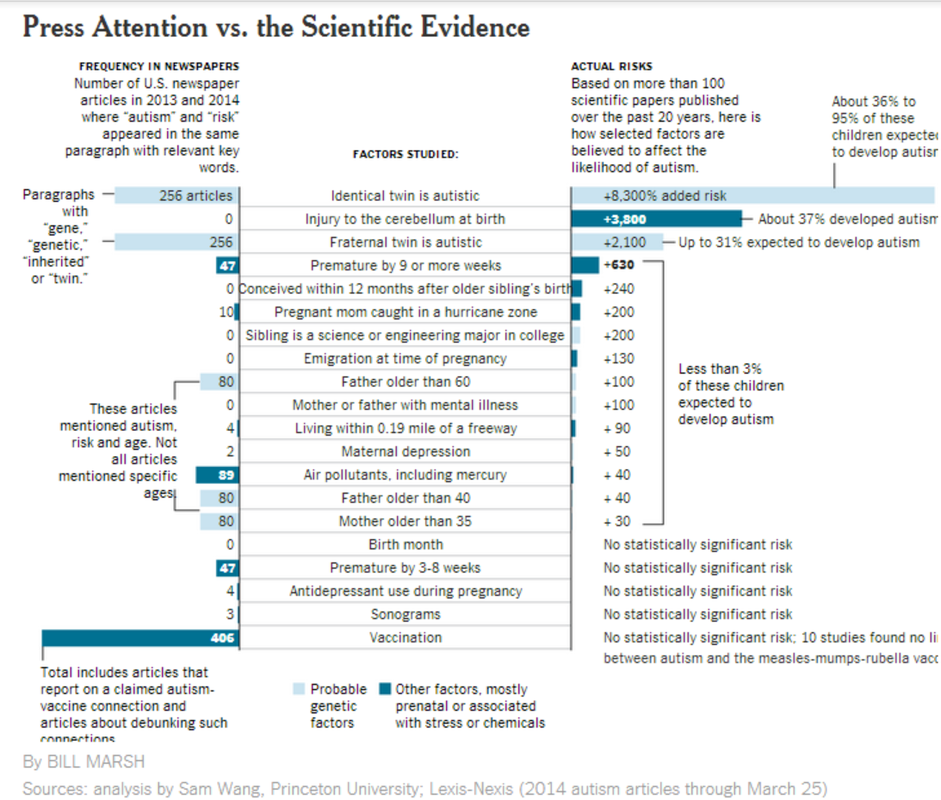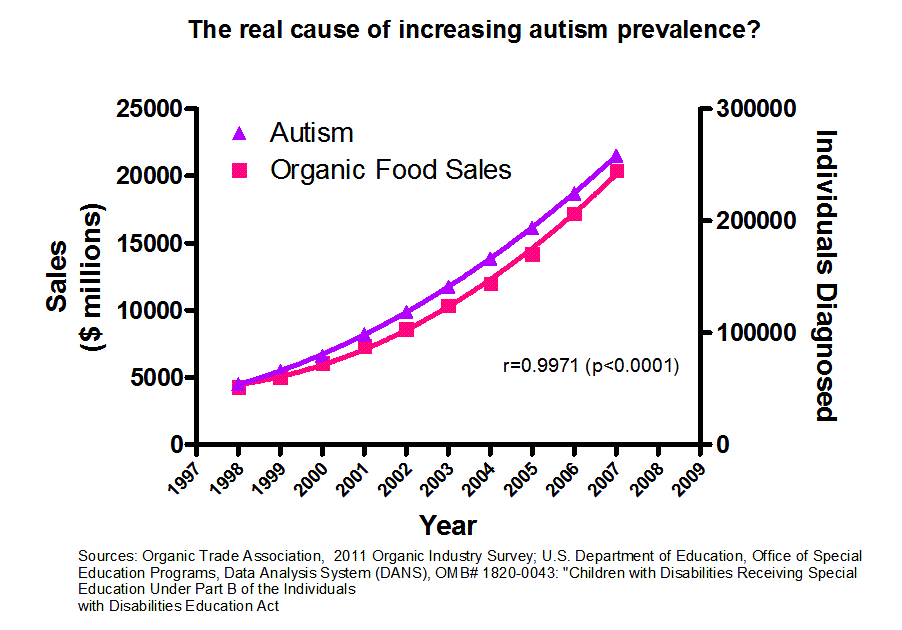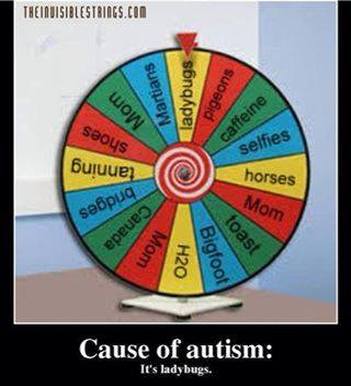What Causes Autism?
This is a question that can either have the shortest answer in the world, or the longest. That's because the real answer is simply this: we don't know yet. All we know for sure is that it's genes and environment working in tandem.
This is the most true answer I can give you. It is also an absolutely terrible answer. I can go into the details of it - how according to the NIH, "as many as 1,000 genes ... are suspected to contribute to the risk of developing ASD" and how, though we don't know the environmental components yet we're starting to find evidence for some (spoiler alert - they're not the ones sensationalized in the news). But telling you this doesn't change the core fact here: that this answer is incredibly unsatisfying and hard to swallow. Our instinct may be to deny it, but that does not change its truth.
This is the moment where you can choose to take either the metaphorical red pill (reality) or the blue pill (believing in an easier to swallow fiction).
Have you chosen? In that case, those of you who chose the red pill - here's the reality:
This is the most true answer I can give you. It is also an absolutely terrible answer. I can go into the details of it - how according to the NIH, "as many as 1,000 genes ... are suspected to contribute to the risk of developing ASD" and how, though we don't know the environmental components yet we're starting to find evidence for some (spoiler alert - they're not the ones sensationalized in the news). But telling you this doesn't change the core fact here: that this answer is incredibly unsatisfying and hard to swallow. Our instinct may be to deny it, but that does not change its truth.
This is the moment where you can choose to take either the metaphorical red pill (reality) or the blue pill (believing in an easier to swallow fiction).
Have you chosen? In that case, those of you who chose the red pill - here's the reality:
Still have remaining concerns about the cause of autism, or disagree with something that Dr. Chung said? Read on:
But I Read/Heard That ____ Causes Autism!
I hate to break it to you, but you were misled. What with a sensationalist media and the dubious evidence out there on the Internet, you can't be blamed for falling victim to this. Hopefully this chart will make it easier to understand the mismatch between what you've heard and reality (click on it to enlarge).
Unsurprisingly, the media goes for the sensationalist story, the one which will get the most clicks or newspaper purchases. And whatever the cause de jour is, it's pretty consistently something after birth, something that will get friends and family members to click on a link or buy the magazine. Something we, as family members and parents and friends, feel like we can do something about.
As you'll note looking at the graphic, reality does not support that point of view. You can make it so your child doesn't get vaccines. You can't make it so that your child is not premature (you can try, but it can occur despite even the best of efforts), and you can't change your child's genes. It's not easy to accept, but it is reality. (Yes, there is a theme here.)
As you'll note looking at the graphic, reality does not support that point of view. You can make it so your child doesn't get vaccines. You can't make it so that your child is not premature (you can try, but it can occur despite even the best of efforts), and you can't change your child's genes. It's not easy to accept, but it is reality. (Yes, there is a theme here.)
Don't Vaccines Cause Autism?
The short answer is no. For the longer answer, you have your choice of explanations - a video or an infographic (click to enlarge).
*Also, a caveat on the video. Though the autism diagnoses are rising, it's not increasing in prevalence. But that's a point for another article...
|
And this idea of vaccines causing autism is incredibly harmful. Check out my blog post, where I collaborated with a friend who had a vaccine preventable disease, for more.
|
My Child Regressed After Exposure to ___
First of all, you have my sympathies and compassion. Though my motto is always "different, not less," I understand that this is a very traumatic thing for parents to witness. After your child regresses, or you start spotting signs where there seemingly weren't any before, you understandably want to know a cause. Something to give you some explanation of what happened. I sympathize with that, and I wish I could help you there.
Unfortunately, all I can tell you is what was almost certainly not the cause. Even if you ignore all the scientific evidence about environmental causes of autism, common sense interpreting yet more evidence will lead you to an inevitable conclusion. There's evidence pointing to the fact that all autistic kids regress, no matter what environment they're raised in (even the ones who don't seem to - the difference is just more subtle). And we've found signs of abnormal development in autistic children prior to their regression. These don't point to a child in whom autism did not previously exist before an exposure to some environmental toxin (well, after birth, that is). They point to a child that was always autistic, with or without (post birth) environmental exposures. (Read this article for the source of my words and for more information on this count.)
Unfortunately, all I can tell you is what was almost certainly not the cause. Even if you ignore all the scientific evidence about environmental causes of autism, common sense interpreting yet more evidence will lead you to an inevitable conclusion. There's evidence pointing to the fact that all autistic kids regress, no matter what environment they're raised in (even the ones who don't seem to - the difference is just more subtle). And we've found signs of abnormal development in autistic children prior to their regression. These don't point to a child in whom autism did not previously exist before an exposure to some environmental toxin (well, after birth, that is). They point to a child that was always autistic, with or without (post birth) environmental exposures. (Read this article for the source of my words and for more information on this count.)
But I Read a Study That Showed a Correlation Between _____ and Autism.
One of the difficulties with sorting out an environmental cause of autism is the difference between correlation and causation. For example, it is a fact that as organic food consumption has increased, so have rates of autism diagnosis.
Am I saying that eating organic food causes autism? Certainly not, and no one would say that (which, despite looking very official, was actually done as a joke and is riddled with errors and not at all accurate - the moral of the story here is always check the footnotes). What I am saying is that yes, it's true, the number of people eating organic food has increased over the years and so have the number of people diagnosed with autism, but one thing doesn't necessarily have anything to do with the other. Likewise, it's hard to tell whether increases in other environmental factors have caused autism rates to increase, or whether they're simply correlated and there are other variables (in the case of organic food, simply the passage of time) that can explain their increases.
This is one of the reasons that determining a true cause is so difficult and claims of success deemed so controversial. So whenever you read that something is "linked" to autism or "correlated" with autism, realize that this is what they're referring to, and while it may mean something, it may be (and most likely is) like the organic food and autism correlation and mean nothing at all. When it comes to figuring out what causes autism, skepticism is your friend. Which is why, when we hear about the latest "We've found the cause of autism!" announcement on TV, those of us who have been around for a while tend to have a rather jaded reaction:
This is one of the reasons that determining a true cause is so difficult and claims of success deemed so controversial. So whenever you read that something is "linked" to autism or "correlated" with autism, realize that this is what they're referring to, and while it may mean something, it may be (and most likely is) like the organic food and autism correlation and mean nothing at all. When it comes to figuring out what causes autism, skepticism is your friend. Which is why, when we hear about the latest "We've found the cause of autism!" announcement on TV, those of us who have been around for a while tend to have a rather jaded reaction:
I Think I Caused My Child to Be Autistic
My fear in writing all of this is that an older parent, looking at the statistics about parental age and autism, or a mother who took valproic acid or thalimodide during pregnancy, might look at these statistics and blame themselves for not having done something differently. My fear is not unfounded - many parents have mentioned this concern to me, my own mother included.
If you feel this way, there is nothing I can say to magically make those feelings go away (although they are unmerited). But I can, and will, try to bring you comfort from my family's own experiences. Know that your child's reaction to this knowledge may be much different than you think. My mother blamed herself for years, thinking there must have been some kind of prenatal toxin she exposed herself to unwittingly that caused Caley to be autistic. Finally, after almost two decades of feeling this way, my mother finally revealed her feelings of guilt to my sister.
You know what Caley's reply was? She said, if something you did caused my autism - which we're not sure it did - I would ask you to go back and do it all over again, because I like my life and I like myself just the way I am.
Autistic people don't tend to see their autism the same way as society does, and your child may well feel the same way as Caley when they're older.
If you feel this way, there is nothing I can say to magically make those feelings go away (although they are unmerited). But I can, and will, try to bring you comfort from my family's own experiences. Know that your child's reaction to this knowledge may be much different than you think. My mother blamed herself for years, thinking there must have been some kind of prenatal toxin she exposed herself to unwittingly that caused Caley to be autistic. Finally, after almost two decades of feeling this way, my mother finally revealed her feelings of guilt to my sister.
You know what Caley's reply was? She said, if something you did caused my autism - which we're not sure it did - I would ask you to go back and do it all over again, because I like my life and I like myself just the way I am.
Autistic people don't tend to see their autism the same way as society does, and your child may well feel the same way as Caley when they're older.
Why Are We Spending So Much Time Talking About the Cause of Autism?
ASE has a survey section where readers can write in and give feedback about their favorite and least favorite articles. One autistic reader took the survey, and chose the cause article as their least favorite one. Do you know why? They said, they didn't see the point of talking about it. They have an excellent point.
I would give my answer as being that I talk about cause because people have so many harmful misconceptions of it. If you falsely believe mercury from vaccines causes autism, for instance, the next 'logical' step is chelation, an unnecessary and harmful treatment to remove heavy metals from the body, which resulted in the death of one child. If parents had only understood that mercury from vaccines (the chemical in question, by the way, thimerosol, was long ago disproven as a cause and is also no longer in all but the seasonal flu vaccine...but diagnosis rates have continued to increase) did not, in fact, cause autism, that child would still be alive today.
But I would have you ask yourself that same question. Why is the cause so important to you? I grant you, I'd like to know the causes (there is no way there's going to be just one cause), but I'm extraordinarily skeptical of our ability to do so. Untold amounts of money and time have already been funneled into the subject for decades now, and still all we have to show for it is "It's some combination of genes and environment."
Imagine, as I do and many autistic people do as well, what the world would be like if all that money and time and emotional energy had been funneled instead into services and therapy. Our world would be a very different place for autistic people who - due to lack of funding and emotional energy - too often grow into adulthood only to find that services for them dry up. Who too often even as children have trouble finding qualified autism professionals to help them.
Imagine the world where those millions of dollars we'd pumped into finding a cause had been devoted instead to helping the people who are here right now. It would be a better world.
I'm not saying we can't do research into the cause or that it's not important. But I am saying that we need to redefine our priorities.
I would give my answer as being that I talk about cause because people have so many harmful misconceptions of it. If you falsely believe mercury from vaccines causes autism, for instance, the next 'logical' step is chelation, an unnecessary and harmful treatment to remove heavy metals from the body, which resulted in the death of one child. If parents had only understood that mercury from vaccines (the chemical in question, by the way, thimerosol, was long ago disproven as a cause and is also no longer in all but the seasonal flu vaccine...but diagnosis rates have continued to increase) did not, in fact, cause autism, that child would still be alive today.
But I would have you ask yourself that same question. Why is the cause so important to you? I grant you, I'd like to know the causes (there is no way there's going to be just one cause), but I'm extraordinarily skeptical of our ability to do so. Untold amounts of money and time have already been funneled into the subject for decades now, and still all we have to show for it is "It's some combination of genes and environment."
Imagine, as I do and many autistic people do as well, what the world would be like if all that money and time and emotional energy had been funneled instead into services and therapy. Our world would be a very different place for autistic people who - due to lack of funding and emotional energy - too often grow into adulthood only to find that services for them dry up. Who too often even as children have trouble finding qualified autism professionals to help them.
Imagine the world where those millions of dollars we'd pumped into finding a cause had been devoted instead to helping the people who are here right now. It would be a better world.
I'm not saying we can't do research into the cause or that it's not important. But I am saying that we need to redefine our priorities.




